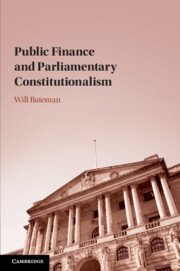Book contents
- Public Finance and Parliamentary Constitutionalism
- Public Finance and Parliamentary Constitutionalism
- Copyright page
- Dedication
- Contents
- Figures
- Preface
- Acknowledgements
- Notes on the Text
- Abbreviations
- 1 Finance and Constitutionalism
- Part I Historical Development of Parliamentary Public Finance
- 2 History (I): Parliament and Executive
- 3 History (II): Judiciary
- 4 History (III): Exporting Parliamentary Public Finance
- 5 History (IV): Public Finance in the Modern State
- Part II Parliamentary Public Finance in Operation
- Part III Evaluating Parliamentary Public Finance
- Bibliography
- Index
3 - History (II): Judiciary
from Part I - Historical Development of Parliamentary Public Finance
Published online by Cambridge University Press: 16 September 2020
- Public Finance and Parliamentary Constitutionalism
- Public Finance and Parliamentary Constitutionalism
- Copyright page
- Dedication
- Contents
- Figures
- Preface
- Acknowledgements
- Notes on the Text
- Abbreviations
- 1 Finance and Constitutionalism
- Part I Historical Development of Parliamentary Public Finance
- 2 History (I): Parliament and Executive
- 3 History (II): Judiciary
- 4 History (III): Exporting Parliamentary Public Finance
- 5 History (IV): Public Finance in the Modern State
- Part II Parliamentary Public Finance in Operation
- Part III Evaluating Parliamentary Public Finance
- Bibliography
- Index
Summary
This chapter provides an historical analysis of the UK judiciary's limited role in central government public finance throughout the eighteenth and nineteenth centuries. Tax litigation represented the high point of judicial involvement in public finance, but judges' hostility to fiscal legislation did little to bolster Parliament's revenue-raising interests. Mid-nineteenth century explorations with judicial review of appropriation legislation never became a settled practice and the judiciary imposed no discernible constraints on the legal limits of public borrowing (by the Treasury) or lending (by the Bank of England). By the conclusion of the nineteenth century, it was clear that the common law judiciary would not have a prominent role in the model of parliamentary public finance which was exported throughout the common law world. Various celebrated and important cases are critiqued, including: Auckland Harbour Board v The King; Bowles v Bank of England; the Bankers' Case; and The Queen v The Lords Commissioners of the Treasury.
Keywords
- Type
- Chapter
- Information
- Public Finance and Parliamentary Constitutionalism , pp. 63 - 80Publisher: Cambridge University PressPrint publication year: 2020

